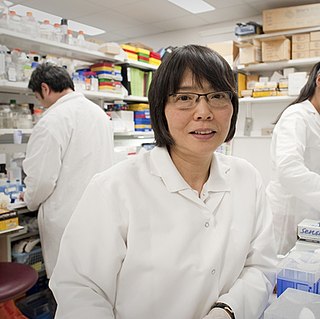The Eunice Kennedy Shriver National Institute of Child Health and Human Development (NICHD) is one of the National Institutes of Health (NIH) in the United States Department of Health and Human Services. It supports and conducts research aimed at improving the health of children, adults, families, and communities, including:

Duane Alexander was an American medical doctor who was the director of the National Institute of Child Health and Human Development from 1986 through 2009. In 2009 he moved to the position of senior scientific advisor to the Director of the NIH's Fogarty International Center.

Jennifer Lippincott-Schwartz is a Senior Group Leader at Howard Hughes Medical Institute's Janelia Research Campus and a founding member of the Neuronal Cell Biology Program at Janelia. Previously, she was the Chief of the Section on Organelle Biology in the Cell Biology and Metabolism Program, in the Division of Intramural Research in the Eunice Kennedy Shriver National Institute of Child Health and Human Development at the National Institutes of Health from 1993 to 2016. Lippincott-Schwartz received her PhD from Johns Hopkins University, and performed post-doctoral training with Richard Klausner at the NICHD, NIH in Bethesda, Maryland.
Data Sharing for Demographic Research (DSDR) advances research on maternal and child health and the life course by making data discoverable and accessible for secondary analysis. DSDR is a research data and information repository that adheres to the FAIR principals. DSDR focuses on data with external validity that can be generalized to populations.
The Pediatric Trials Network (PTN) is a consortium of clinical research sites located around the United States that are cooperating in the design and conduct of clinical trials to improve medication labels affecting dosages for young patients. It conducts trials under the Best Pharmaceuticals for Children Act, passed in 2002. The network is sponsored by the Eunice Kennedy Shriver National Institute of Child Health and Human Development (NICHD).

Diana W. Bianchi is the director of the U.S. National Institutes of Health Eunice Kennedy Shriver National Institute of Child Health and Human Development, a post often called “the nation’s pediatrician.” She is a medical geneticist and neonatologist noted for her research on fetal cell microchimerism and prenatal testing. Bianchi had previously been the Natalie V. Zucker Professor of Pediatrics, Obstetrics, and Gynecology at Tufts University School of Medicine and founder and executive director of the Mother Infant Research Institute at Tufts Medical Center. She also has served as Vice Chair for Research in the Department of Pediatrics at the Floating Hospital for Children at Tufts Medical Center.

Yoke Peng Loh is an American biochemist and molecular biologist currently acting as Senior Investigator and Head at the Section on Cellular Neurobiology, Laboratory of Developmental Neurobiology, Eunice Kennedy Shriver National Institute of Child Health and Human Development (NICHD), National Institutes of Health (NIH). She earned a B.S. in biochemistry at University College Dublin in 1969 and a Ph.D. from the University of Pennsylvania in 1973. She did her postdoctoral work with Harold Gainer at NIH and at the Max Planck Institute in Germany.

Judith L. Vaitukaitis was a reproductive neuroendocrinologist and clinical researcher who played a key role in developing a biochemical assay in the early 1970s that ultimately led to the creation of the home pregnancy test. She served for 12 years as director of the US National Center for Research Resources (NCRR) at the US National Institutes of Health (NIH).

Rachel Schneerson is a former senior investigator in the Laboratory in Developmental and Molecular Immunity and head of the Section on Bacterial Disease Pathogens and Immunity within the Laboratory at the Eunice Kennedy Shriver National Institute of Child Health and Human Development within the National Institutes of Health. She is best known for her development of the vaccine against bacterial meningitis with her colleague John B. Robbins.

Yvonne T. Maddox is an American academic who currently works as vice president for research at the Uniformed Services University. She was previously the acting director of the National Institute on Minority Health and Health Disparities. Her career at the National Institutes of Health also includes previous leadership roles as acting deputy director of the National Institutes of Health and deputy director of the Eunice Kennedy Shriver National Institute of Child Health and Human Development.

Keiko Ozato is a Japanese American geneticist whose research has focused on gene regulation in the developing immune system; She is best known for her contributions to immunogenetics and epigenetics in isolating the IRF8 transcription factor that aids humans in fighting off disease and for identifying the BRD4 protein that regulates cellular and viral genes that can invoke epigenetic memory. She is Senior Investigator at the Section on Molecular Genetics of Immunity at the Eunice Kennedy Shriver National Institute of Child Health and Human Development (NICHD) at the National Institutes of Health in Bethesda, Maryland and a professor at the University of Maryland, College Park.

Ida Stephens Owens was an American scientist known for her work with drug-detoxifying enzymes. She received her Ph.D from Duke University in 1967, making her one of the first two African Americans to receive a doctorate from the school. She spent her career at the National Institutes of Health (NIH), where she worked from 1968 to 2017 and pioneered the study of the genetics of human diseases and drug metabolism.

Gisela Storz is a microbiologist at the Eunice Kennedy Shriver National Institute of Child Health and Human Development (NICHD) at the National Institutes of Health (NIH). She is a member of the National Academy of Sciences.

Alison Nenos Cernich is an American neuropsychologist specializing in traumatic brain injury and computerized neuropsychological assessment. She is the deputy director of the Eunice Kennedy Shriver National Institute of Child Health and Human Development. Cernich was previously deputy director of the Defense Centers of Excellence for Psychological Health and Traumatic Brain Injury, assistant professor of neurology at University of Maryland School of Medicine, and chief of neuropsychology at the VA Maryland Health Care System.

Mary C. Dasso is an American biochemist known for research on chromosome segregation and the discovery of Ran GTPase. She is the acting scientific director of the division of intramural research and a senior investigator in the section on cell cycle regulation at the Eunice Kennedy Shriver National Institute of Child Health and Human Development.
Germaine M. Buck Louis was the Dean of the George Mason University College of Health and Human Services and professor in Mason’s Department of Global and Community Health. She led the College in becoming Virginia's first accredited College of Public Health prior to her retirement in 2022. Her expertise focuses on environmental exposures and human health, particularly human reproduction and pregnancy. Prior to her appointment as dean at George Mason in 2017, she was the founding Director for the Division of Intramural Population Health Research at the Eunice Kennedy Shriver National Institute of Child Health and Human Development.

Shioko Kimura is a Japanese-American biochemist specialized in endocrinology and the physiology and pathogenesis of diseases including thyroid and lung cancers. She heads the endocrinology section in the laboratory of metabolism at the National Cancer Institute.

Cuilin Zhang is a Chinese-American epidemiologist and physician-scientist researching the roles of genetic and environmental factors in the pathogenesis of gestational diabetes, type 2 diabetes, and obesity and health consequences of these complications. Zhang is a senior investigator and acting chief of the epidemiology branch at the Eunice Kennedy Shriver National Institute of Child Health and Human Development.
Catherine Mason Gordon is an American pediatrician who is clinical director of the Eunice Kennedy Shriver National Institute of Child Health and Human Development, National Institutes of Health.

Tracey Ann Rouault is an American rheumatologist and physician-scientist who researches mammalian iron-sulfur proteins. Rouault is a senior investigator at the Eunice Kennedy Shriver National Institute of Child Health and Human Development and she heads the section on human iron metabolism.















